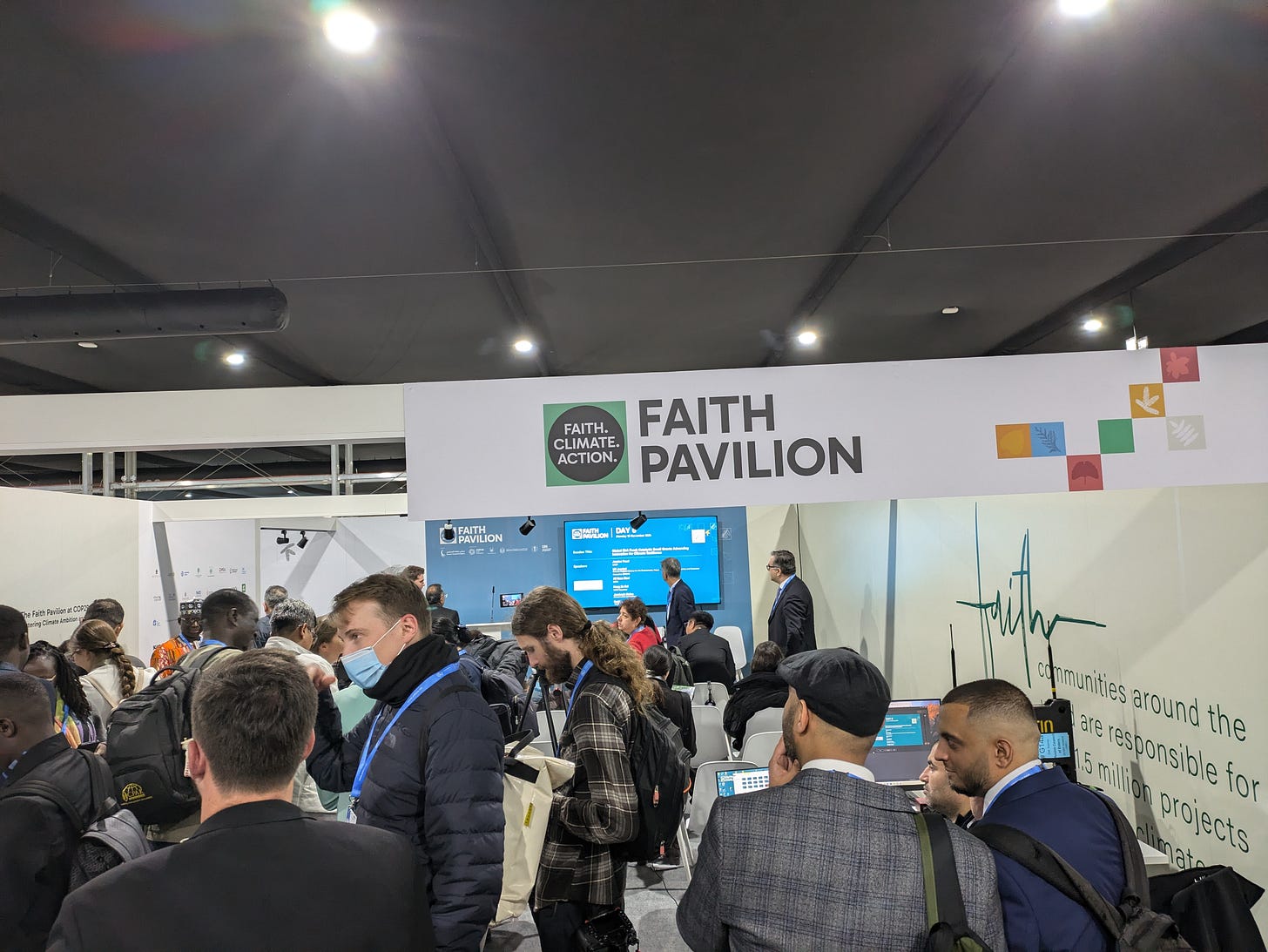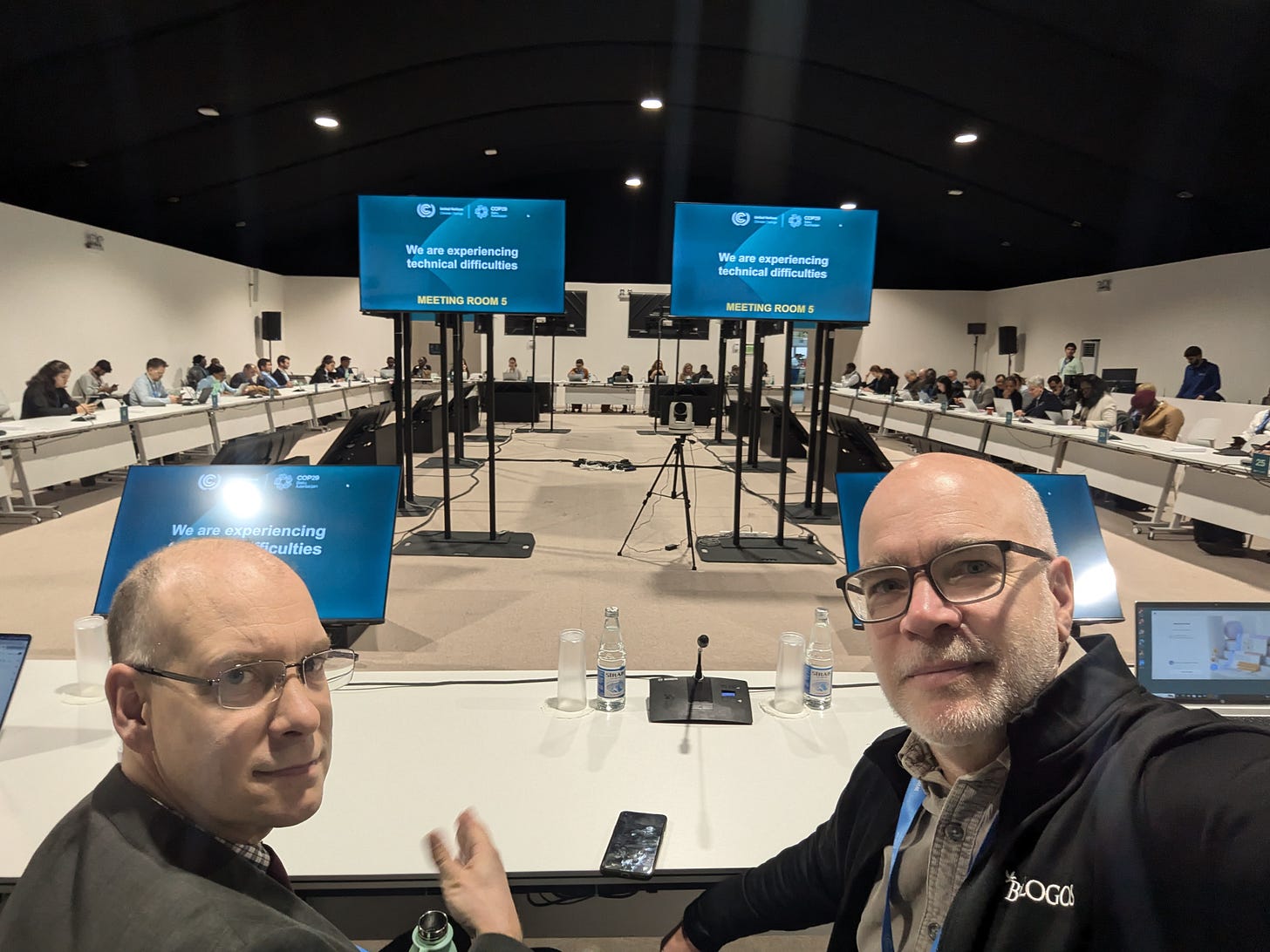A Sense of Urgency?
Today started early… I guess it started the same time all days do, but my awareness of it began earlier than most. We had to be packed and out of our hotel by 7:00am so we could take Bolts to the basecamp house. Getting a Bolt is just like getting an Uber, except I can’t get any of my credit cards to work with them, so I have to choose the cash option. After getting used to not paying after getting out of an Uber, it now feels weird to have to pay the driver on the way out. Our driver this morning was not what you usually find on an Uber. His car was pretty clunky. It was raining and the windshield wipers wouldn’t stay on. My seatbelt wouldn’t come out of its socket. And all the windows were fogging up, but he’d just turn the defroster on in spurts. But we made it in one piece.
The team all arrived by about 8:00am and had some breakfast and orientation. Then we were released to go to the Blue Zone at COP for the first time. Getting there takes some planning… and patience. The CCOP group runs on a budget, so we don’t stay at the Four Seasons downtown and have a private limo company take us to the Blue Zone. There are various bus stops that the COP set up just for getting people around the city, and our badge gets us onto them for free. But they don’t exactly come out to the mission house where we’re staying. So you can either take a Bolt again to get to the bus hub… or you can walk. We’re at a climate conference, and that means there are competing values forefront in your mind between ease, cost, and carbon footprint. Yes, we flew to get here, because there wasn’t really another choice. But now we do have a choice, so I chose to go with the walking group. The first bus hub is 2.1 kilometers away. That was roughly 30 minutes of walking. Then we waited for a bus for 20 minutes. Then we had a 20 minute bus ride to Old City, where we transferred to another bus hub. Then another 20 minute ride to get to the Blue Zone. So, we walked out of our house at about 9:15am this morning, and got into the Blue Zone at 10:45. Good thing we weren’t in a hurry.
This year the Blue Zone is like a massive convention center. There are big plenary rooms where thousands of people gather for speeches. There are individual rooms of various sizes where smaller meetings take place. And then there is the exhibition hall which is massive, having individual “pavilions” for about every country and lots of special interests. I put it in scare quotes because it is quite different than my experience at COP28 last year in Dubai. There they really were pavilions, because it was all in this lovely outdoor space that felt like the love child of a county fair and Disney World. Here they have somehow covered the big football stadium and surrounding area, and crammed all the meeting spaces into what looks like manufactured housing.
Today was primarily about getting oriented to the massive space. So I wandered around trying to see what was what in the exhibition space. A few of us tried to go into the plenary hall, because the president of the COP was scheduled to make an address. But then he didn’t come, and someone behind us said that a note had been sent out saying the meeting was rescheduled for sometime between 10am and 2pm. It was already 11:30, but we gave up.
This COP has been called the “finance COP” because there is supposed to be a lot of progress made on figuring out the two big financial implications of climate change: the finance fund, which is supposed to help developing countries skip over the industrial revolution of the developed West, which relied so heavily on burning fossil fuels, and then the Loss & Damage fund which is meant to compensate those same countries for the harm already done to their countries because of our fossil fuel emissions. Any time you start talking about money, things get a little tense.
There is a working group of the UN that has been working on a text on climate finance for four years. They brought that, and now it goes before all the parties (every country recognized by the UN is a party), and they all have to agree. If one party objects, then document is not passed. This is the real work of the COP, and it is bureaucratic and tedious and frustrating. I figured that I should impose some of that on you.
We went into a session today that was supposed to be everyone’s response to the second draft of this document. Everyone is sitting around tables in a big rectangle. They have their country’s name on a placard in front, and one person sitting at the microphone. I started trying to transcribe some of the conversation. Here is a sampling:
Uganda: Thank you for your work on this report. We appreciate the many hours of hard work that has gone into it. However, we find this report to be very long. Many paragraphs could have been deleted. And someone must compel the standing committee to give us some definitions. There are too many places in the text where the meaning is unclear.
European Union: We have not been able to review things carefully, but can give at least one specific piece of feedback now, and reserve the right to give more detailed feedback later: We are not supportive of this committee being given new work, so any of the paragraphs that have mentioned new work, we request that these be deleted.
UK: You have not given us enough time to review the text. I echo the Uganda delegation’s point that the report is much too long. We don’t know how we can be expected to give detailed feedback in so little time.
United States: Thanks for your efforts to produce a new text. We too have not had the chance to fully digest it. We too will give more feedback later, but for now will say that we see several pieces in the text where we should revert to previously used language: paragraphs 8 and 14 could be aligned with the same language rather than trying to say the same thing different ways. And paragraph 15 is too micromanage-y. Please streamline paragraphs 3 and 28. For paragraph 32 we also have a question about whether it would veer into micromanagement for the standing committee on finance.
Australia: We can only give the high-level feedback now that if we don’t have time to talk about the reports, then we shouldn’t be making all the reports.
Several others went on like this, and then the Facilitators of the meeting had to respond to the concerns:
Facilitators: Ok, we have heard that you’ve not had sufficient time. We will give you until 8pm tonight to submit your further comments in writing so that we can get the revised draft to you by tomorrow. We also have a mandate from you to produce the next text that is much more streamlined.
Burkina Faso: I am sorry Facilitators, but we have agenda items going until 9pm tonight. We will need more time beyond 8pm.
Saudia Arabia: We echo Burkina Faso.
Facilitators: How about 10pm? Would that work?
Burkina Faso: We are sorry, but that will not work. We request the time for feedback be set at 8am tomorrow morning.
Facilitators: If we do that, we’ll be in the same position as today. We also need time to produce the new text, and if you need to have it with more time to review what we have done, then we need time to do it. How about 11pm?
Burkina Faso: Ok, that is fair.
Facilitators: Meeting adjourned.
That’s the form of the meetings. I hope to get to more of the substance as the week goes on. There is some urgency in all of this, as the bureaucrats worry about getting the text in the shape that everyone will agree to by the end of the week.
There is more urgency among the people who most badly need the money. I talked to Jocabed for a while today. She is an indigenous Christian from Panama, whose people group is being displaced because of climate change. They used to live on islands off the coast that are becoming uninhabitable because the storms wash sea water up into the land. It’s really powerful to hear directly from people who are experiencing the worst effects of climate change now. They feel like they are at this meeting campaigning for their very existence. Are we ready to welcome them to our land, or is that too inconvenient for our lifestyles?
There’s so much going on at this meeting. Every time you walk in the corridors, people are rushing to get somewhere (usually in the opposite direction we’re trying go!). In one sense, it gives you hope to see people from all over the world trying to do what is best for the future of this planet and its people. In another sense, though, it can be discouraging to think that the future livability of the planet depends on the success of meetings like this. You just don’t see how fussing over individual words in a text will stop the seas from rising in Panama and storms from disrupting crop cycles in Zambia.
Tomorrow I’m the moderator for a session at the faith pavilion that is called, “Hope not Optimism: How religious traditions can cultivate hope even when things aren’t going well.” We’ll have speakers on a panel from three different religious traditions talking about this. I’m hopeful that it will go well! I’ll try to give an account of it tomorrow.





"Are we ready to welcome them to our land [people who used to live on islands off the coast that are becoming uninhabitable because of sea water washing into the land], or is that too inconvenient for our lifestyles?" !!! This is the question!